|
|
|
Sort Order |
|
|
|
Items / Page
|
|
|
|
|
|
|
| Srl | Item |
| 1 |
ID:
165332


|
|
|
|
|
| Summary/Abstract |
This article makes a case for incorporating the concept of ‘Critical Security History’ (CSH) into security studies. While history plays a powerful role in a cornucopia of security stories, we contend that it often goes unnoticed in scholarly research and teaching. Against this backdrop, we present a detailed guide to study how history is told and enacted in non-linear ways. To do this, the article outlines how CSH can contribute to securitisation and ontological security studies. As shown, this lens casts a new light on the legacies of (de)securitisation processes and how they are commemorated. It also illustrates that ontological security studies have only begun to call into question the concept of historicity. Working through these observations, the article marshals insights from Halvard Leira's notion of ‘engaged historical amateurism’ to entice scholars interested in ‘doing’ CSH. While acknowledging that this research agenda is hard to achieve, our study of the 2012 Sarajevo Red Line project helps to illustrate the added value of trying to ‘do’ CSH in theory and in practice. We end with some reflections for future research and continued conversations.
|
|
|
|
|
|
|
|
|
|
|
|
|
|
|
|
| 2 |
ID:
148763
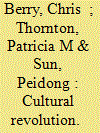

|
|
|
| 3 |
ID:
123192
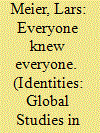

|
|
|
|
|
| Publication |
2013.
|
| Summary/Abstract |
This article explores the transformation of a community and its diversity as narrated by former industrial workers from a neighbourhood in Nuremberg, in a context in which company-based social housing of workers had been replaced by private rented accommodation accessed by middle class residents of migrant backgrounds. In biographical interviews, narratives emerge in which diversity and social difference are not seen as ethnic difference, but rather as a power difference within an established-outsider figuration. In this figuration, heterogeneous past and present cultural practices are homogenised through community control and regulation along normative rules as defined by the established. Workers' nostalgic laments for the loss of their former status show that figuration of established and outsiders is dynamic, opening up new ways of thinking about diverse place-making and alternative perspectives on urban gentrification.
|
|
|
|
|
|
|
|
|
|
|
|
|
|
|
|
| 4 |
ID:
096479
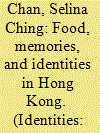

|
|
|
|
|
| Publication |
2010.
|
| Summary/Abstract |
This article adopts a processual and relational approach to study food remembrance and investigates how different ways of appropriating food reveal the politics of identities in Hong Kong. It examines how food memories reveal relationships between the past and the present, reflect epochal transformation, and mark changing identities of various groups of people through new ways of appropriations. It takes the case study of pancai, a special banquet food for the villagers in the New Territories of Hong Kong, to examine the relationships between food and identities. This article investigates how pancai is remembered, popularized, and reinvented with different variations and embodies shifting meanings for the New Territories inhabitants as well as other Hong Kong people in changing socioeconomic and political environments. Pancai has been imbued with multiple layers of significance, involving linkages between local and national, emigration and Chineseness, urbanization and rural heritage, as well as decolonization and identity politics. As identities are by nature negotiable, situational, and fluidic, pancai's multiple layers of meanings correspond to different levels of identities-identities of the New Territories inhabitants, the rest of the Hong Kong people, and the mainland Chinese.
|
|
|
|
|
|
|
|
|
|
|
|
|
|
|
|
| 5 |
ID:
129545
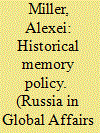

|
|
|
|
|
| Publication |
2014.
|
| Summary/Abstract |
History of Russia narrated as a sequence of only horrors and failures or, on the contrary, as a continuous string of victories and successes is equally unproductive for forming the individual and collective identity.
Active patriotism is a key element of a nation's human capital. Fostering active patriotism requires a consistent policy of memory, including an integral concept of Russia's past that would meet the strategic task of developing society and the state. The past twenty years have seen inefficient and inconsistent efforts to pursue such a policy. The result has been a semi-Soviet individual with almost no links with or emotional feelings for the history of his country and with no knowledge of it. World War II remains the only basic element of the memory policy; however, its emotional impact cannot but decrease with years. An active, consistent and competent policy of memory is needed. Attempts to do without ideology and without a policy of memory have led to disastrous results as regards the moral state of society. Like the state, society has lost its development vector. Instead of creative diversity, there is a destructive chaos in people's minds.
|
|
|
|
|
|
|
|
|
|
|
|
|
|
|
|
| 6 |
ID:
193480
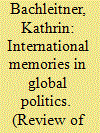

|
|
|
|
|
| Summary/Abstract |
This paper is interested in the role and function of memories in United Nations Security Council debates about humanitarian intervention. It posits that historical experiences and their lessons serve as interpretative devices for the abstract international norms and principles under discussion. The paper speaks of ‘international memories’ where the meaning and lessons derived from the past coalesce among a group of states. Empirically, its case study explores how the memories of totalitarianism/fascism and colonialism were employed in United Nations (UN) representatives’ verbal pleas to intervene in Libya and Syria after the Arab Spring. It finds that those who supported or opposed humanitarian intervention held different interpretations of these memories and their lessons. In each case, however, memories provided essential normative guidance to states when it came to implementing the abstract international principles, norms, and rights that underlie humanitarian intervention.
|
|
|
|
|
|
|
|
|
|
|
|
|
|
|
|
| 7 |
ID:
190086
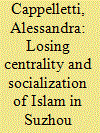

|
|
|
|
|
| Summary/Abstract |
Cultural and political alterity in China is levelled by disrupting local communities and networks, both necessary to keep memories and sense of identity alive through sharing and socialising. By taking Suzhou’s mosques as focal lens, the author assesses an experiential void which is politically and socially created, and shows the consequences of rewriting history. The broken nexus between buildings, communities and memories impacts the historical centrality and socialization of Islam in Suzhou, where communities are dispersed and shared memories are lost. Mosques’ positionality in the urban fabric is assessed through interviews and interaction with local Muslims, and the identification of past surrounding communities and networks. The assessment of the heterotopic dimension and contested memories of Suzhou’s mosques in a contemporary context — performed by collecting historical, intellectual, topographical and architectural fragments — allows us to grasp the highly symbolic dimensions of a past diversity in identity spaces. The role of communities in relation with the city’s rich intellectual past — including its tradition of literati translating Islamic classics from Persian to Chinese — is understood as central, together with a spiritual geography made of connections and relations among places.
|
|
|
|
|
|
|
|
|
|
|
|
|
|
|
|
| 8 |
ID:
195564


|
|
|
|
|
| Publication |
London, Centre for Pakistan Studies, 1997.
|
| Description |
viii, 466p.hbk
|
| Contents |
(B)
|
| Standard Number |
1901899012
|
|
|
|
|
|
|
|
|
|
|
|
Copies: C:1/I:0,R:0,Q:0
Circulation
| Accession# | Call# | Current Location | Status | Policy | Location |
| 060608 | 923.5/KHA 060608 | Main | On Shelf | General | |
|
|
|
|
| 9 |
ID:
157188
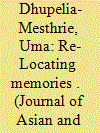

|
|
|
|
|
| Summary/Abstract |
This article plays on the word re-location to examine the memories of Indians in South Africa through oral histories about relocation as a result of the Group Areas Act, to memories of parents and grandparents relocating to South Africa from India as told to interviewers and to their own memories of journeys to India and back. The narratives of mobilities traverse time and national boundaries and are counter-posed by narratives of local mobilities as well as stasis. The article identifies ways of narrating, themes of narration and the meaning of memories while noting the re-location of memory construction against the backdrop of South Africa’s democratic transition and the 150th commemoration of the arrival of indentured Indians to South Africa. It argues that the local and the national are important in narrations of transnational journeys, thus advancing a particular approach to transnational memory studies.
|
|
|
|
|
|
|
|
|
|
|
|
|
|
|
|
| 10 |
ID:
137672


|
|
|
|
|
| Summary/Abstract |
Sleep occupies roughly one-third of our lives, yet the scientific community is still not entirely clear on its purpose or function. Existing data point most strongly to its role in memory and homeostasis: that sleep helps maintain basic brain functioning via a homeostatic mechanism that loosens connections between overworked synapses, and that sleep helps consolidate and re-form important memories. In this review, we will summarize these theories, but also focus on substantial new information regarding the relation of electrical brain rhythms to sleep. In particular, while REM sleep may contribute to the homeostatic weakening of overactive synapses, a prominent and transient oscillatory rhythm called “sharp-wave ripple” seems to allow for consolidation of behaviorally relevant memories across many structures of the brain. We propose that a theory of sleep involving the division of labor between two states of sleep–REM and non-REM, the latter of which has an abundance of ripple electrical activity–might allow for a fusion of the two main sleep theories. This theory then postulates that sleep performs a combination of consolidation and homeostasis that promotes optimal knowledge retention as well as optimal waking brain function.
|
|
|
|
|
|
|
|
|
|
|
|
|
|
|
|
| 11 |
ID:
185176
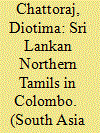

|
|
|
|
|
| Summary/Abstract |
The Sri Lankan conflict that officially ended in 2009 resulted not only in large numbers of Tamils leaving the country to join the vast global Tamil diaspora but also created many internally displaced persons (IDPs) from Sri Lanka’s Northern Tamil communities who settled in Colombo. This article examines the idea of home among such IDPs, showing how broken memories of an earlier home and different approaches towards return shape feelings of being an ‘insider’ or ‘outsider’ among Tamil IDPs in Colombo. Drawing on the life experiences of such IDPs, the article shows that they now often view Colombo as a more suitable home yet are still ‘becoming insiders’ rather than ‘being insiders’.
|
|
|
|
|
|
|
|
|
|
|
|
|
|
|
|
| 12 |
ID:
186176
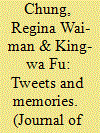

|
|
|
|
|
| Summary/Abstract |
Instead of focusing on the regime’s control mechanism, this study identified a group of Chinese netizens who, despite being well aware of media censorship, posted on social media to commemorate the 1989 Tiananmen Square Massacre annually. Drawing on the concepts of ritualization and social signalling, 1,256 censored Sina Weibo posts published on June 1–4 between 2012 and 2018 were analysed and thematically classified into five categories: collective narratives and counter-discourse, remembrance, condemnation, citizen reporting, and response to current political suppression. The authors argued that tweeting and being censored have paradoxically become a ceremonial ritual for Chinese netizens. By posting serious, playful, and satirical messages, Chinese netizens send costly signals to express dissatisfaction toward the country’s problems.
|
|
|
|
|
|
|
|
|
|
|
|
|
|
|
|
| 13 |
ID:
137677
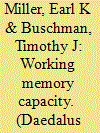

|
|
|
|
|
| Summary/Abstract |
Why can your brain store a lifetime of experiences but process only a few thoughts at once? In this article we discuss “cognitive capacity” (the number of items that can be held “in mind” simultaneously) and suggest that the limit is inherent to processing based on oscillatory brain rhythms, or “brain waves,” which may regulate neural communication. Neurons that “hum” together temporarily “wire” together, allowing the brain to form and re-form networks on the fly, which may explain a hallmark of intelligence and cognition: mental flexibility. But this comes at a cost; only a small number of thoughts can fit into each wave. This explains why you should never talk on a mobile phone when driving.
|
|
|
|
|
|
|
|
|
|
|
|
|
|
|
|
|
|
|
|
|